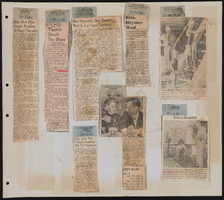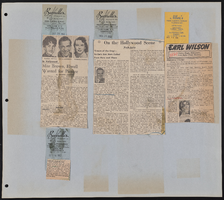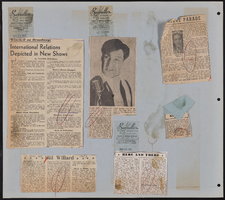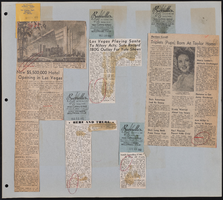Search the Special Collections and Archives Portal
Search Results

Interview with Erma (E.B.) Johnson, December 21, 2005
Date
Archival Collection
Description
Text
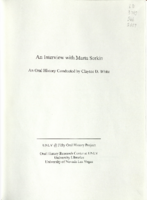
Transcript of interview with Marta Sorkin by Claytee White, March 2, 2009
Date
Archival Collection
Description
In this interview, conducted for the 50th anniversary of UNLV, Marta Sorkin discusses her family and her experience moving to California, and then to Las Vegas. Sorkin worked at the James R. Dickinson Library at UNLV and later in Lied Library, helping to implement and update various databases, and create displays on current topics. She briefly discusses her involvement with Hillel and the Jewish Federation of Las Vegas.
Marta Sorkin begins by reminiscing about her childhood in Far Rockaway Long Island, New York. She details the life her parents lived, which set an example for Marta and her two siblings. Through hard work, advanced education, and involvement in causes that were important to them, they created the template by which Marta lives her life. Marta describes her early work history, which included modeling, sales, library work, and working part time in her father's dry-cleaning plant. She and her daughter were living with her parents for a time in California, and they visited Las Vegas on weekends. It was during one of those visits that Marta met her second husband-to-be. They eventually married and decided to settle in Las Vegas. In Las Vegas, Marta enrolled at UNLV, became involved with the Preservation Association of Clark County, and volunteered at the Jewish Federation of Las Vegas. In addition, she completed her BA and MA degrees at UNLV and started working at the university's library. She details her work there, including creating display cases, working in the reference section, doing research for students and faculty, and compiling interviews. Marta also describes the fundraisers she spearheaded to help raise money for the various societies she was involved with: non-events, pancake breakfasts, dinners, and dance and band performances. In her closing comments she mentions an interview she did for Ralph Roske's class and expresses her appreciation for the career she's had at UNLV.
Text

Transcript of interview with Shecky Greene by Barbara Tabach, June 5, 2018
Date
Archival Collection
Description
At the time of this interview, Shecky Greene (1926 - ) is energetically snuggled into his modest Henderson home. His wit and signature sense of humor are at in full swing. Shecky sees a joke in every nook and cranny of a conversation and seamlessly spins the moment with a tune or voice characterization. A native of Chicago, his given name is Fred Sheldon Greenfield. His Jewish parents, Bessie and Carl Greenfield raised Shecky and his older two brothers in a secular but kosher setting. He recalls honing his humor as a child and creating his path to a decades-long career in comedy lounges and in film. His narrative glitters with names of Las Vegas entertainment history. He also talks about his passion for the St. Judes Ranch in Boulder City.
Text

Transcript of interview with Margaret Price by Joanne Goodwin, March 5, 1997
Date
Archival Collection
Description
When farm-girl-turned-waitress, Margaret "Maggie" Price, came to Las Vegas from Ohio in 1950 with her husband, Francis "Frank" Price, she had no idea what was in store for her in the hot desert oasis. Maggie's career spanned a period of historical transformation in Las Vegas when Downtown was becoming overshadowed by the development on the Las Vegas Strip. Vaudeville and striptease acts were still alive, but the arrival of big-named acts, such as the Rat Pack, Barbara Streisand, and the King himself, Elvis Presley, were just beginning to take the lead. Organized crime was still a prominent part of the culture and brothels still operated somewhat openly. The three decades Maggie and Frank worked in Las Vegas provided them with front-row seats for the birth, transformation, and occasional death of numerous casinos, including the Sahara, the Flamingo, the Sands, the Dunes, the Tropicana, and the International. Initially going to work as a waitress at the El Rancho Vegas, Maggie
Text

Transcript of interview with Audrey Wickman by Joanne Goodwin, June 24, 1996
Date
Archival Collection
Description
Born in the coal fields of Strunk, Kentucky, Audrey Aline Messer Wickman first visited the West at twelve years of age. She moved to western Colorado to help in her grandparents’ home for a couple of years. The stay made a lasting impression because she only returned to her birthplace for a short time after that. In Colorado, she graduated from high school, met her future husband, and married in 1925. They came to southern Nevada in 1932 so that Robert Wickman could find work on Hoover Dam. Audrey Wickman joined the Mesquite Club in 1936 and has remained a member to date. She started the Literary Committee as a forum to share book reviews and hear speakers. She served as President of the club for 1947-48 and chose the year’s theme “Know your Neighbor.” In the post-war society, women’s involvement in civic affairs was particularly needed, she told the membership at the opening fall meeting. “The troubles which unsettle the world today are primarily ones which lie within the sphere of women’s business. They are matters of housekeeping, teaching and health. . . . The time has come when we as a nation cannot stay in our own backyards. . . . If we are to be good world citizens, local, state and national, we must first be good home citizens. These responsibilities call for knowledge, an appreciation of other points of view, and attitudes of good will and cooperation.” (Las Vegas Review Journal, 6 October 1947, Mesquite Club microfilm collection.) The duties of the president varied during those years. She recalled that “I was janitor, gardener and President.” During the wintertime, she remembered, “you had to have heat [for Friday’s meeting] and I’d go up on Thursday afternoon and light that old oil burning stove and then pray that it didn’t catch the place on fire all night.” She continued her commitment to club work by serving as state secretary for the Nevada Federation of Women’s Clubs. The friendships and cultural events which came from Mesquite Club and Federation membership proved to be of lasting value for this community builder. This interview has been produced with the assistance of the Mesquite Club and the History Department of the University of Nevada, Las Vegas. It is part of a series on women community builders in Las Vegas. The transcript has been edited only slightly for clarity while the syntax and style of the narrator were retained.
Text

